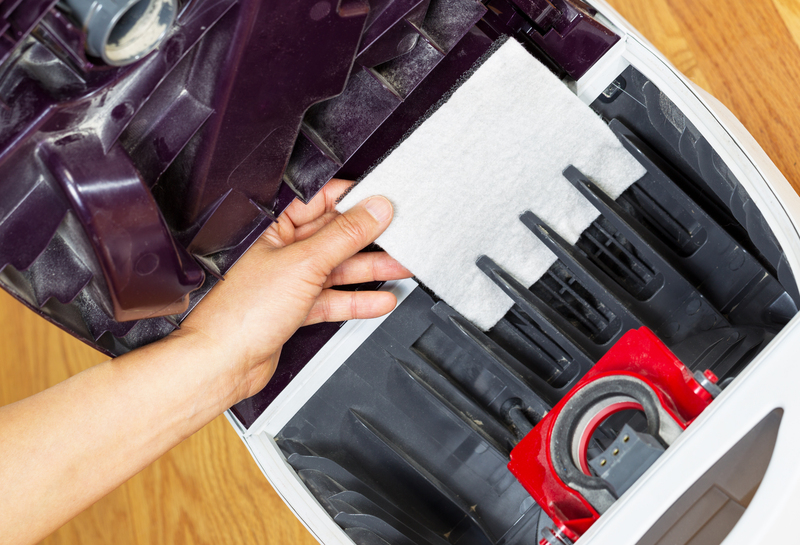Upgrade Your Home Ambiance by Removing Pet Odors
Posted on 26/06/2025
Upgrade Your Home Ambiance by Removing Pet Odors
Our beloved pets bring immense joy and companionship to our homes, but sometimes they unintentionally leave behind lingering odors. If you find yourself wondering how to create a fresh, inviting atmosphere free from pet smells, you've come to the right place. In this guide, we'll explore expert tips and proven techniques to upgrade your home's ambiance by removing pet odors for good.
Why Is It Important to Eliminate Pet Odors from Your Home?
Beyond just being unpleasant, pet odors can linger and permeate fabrics, furniture, and even the air you breathe. Persistent pet smells can impact indoor air quality and make your house feel less inviting to guests. Thankfully, there are multiple approaches to both remove and prevent pet odors, ensuring your home remains a haven for you, your family, and your furry friends.
Health Benefits of a Fresh-Smelling Home
- Improved air quality: Lingering pet odors can carry bacteria and allergens, which may cause discomfort or health issues for sensitive individuals.
- Reduced stress: A fresh-smelling environment is naturally more relaxing, helping to lower stress for both humans and pets.
- Increased comfort for guests: No one wants to visit a home that smells overwhelmingly of pets. Removing pet odors ensures your home radiates warmth and hospitality.

Understanding the Sources of Pet Odors
Before diving into solutions for eliminating pet odors, it's crucial to understand where these smells originate. Pets naturally shed fur, skin cells, and oils, all of which can accumulate over time. Accidents, litter boxes, cages, and even pet beds may also harbor unwanted scents.
Common Sources of Pet Odor
- Upholstered furniture and carpets - absorb pet smells deep in their fibers
- Pet bedding and toys - can hold onto smells after prolonged use
- Litter boxes or cages - if not cleaned regularly, these become major sources of odor
- Poorly ventilated spaces - odors concentrate in enclosed areas
Now, let's explore how to upgrade your home ambiance by removing pet odors with practical, effective methods.
Step-by-Step Guide: Removing Pet Odors from Your Home
1. Adopt a Thorough Cleaning Routine
- Vacuum frequently: Use a vacuum with a HEPA filter to remove pet hair, dander, and debris from carpets, rugs, and furniture.
- Wash pet bedding and soft toys: Launder these items weekly in hot water to minimize odors.
- Mop hard floors: Use pet-safe floor cleaners to address any lingering scents or residue.
Consistent cleaning is the foundation for a fresh-smelling home environment.
2. Target High-Traffic Pet Areas
- Scrub litter boxes and cages: Clean litter boxes daily, and wash cages or tanks weekly with warm, soapy water.
- Spot-clean accidents immediately: Blot up urine or vomit with paper towels, then use an enzymatic cleaner to break down the odor-causing proteins.
3. Neutralize Pet Odors with Natural Remedies
- Baking soda: Sprinkle on carpets or furniture, let sit for 30 minutes, then vacuum - baking soda is excellent at absorbing stubborn smells.
- White vinegar: Mix a 1:1 solution of water and vinegar, spray lightly on affected areas, and allow to dry.
- Activated charcoal: Place charcoal bags near odor-prone areas to neutralize the air naturally.
- Essential oils (used safely): Add a few drops of pet-safe oils (like lavender or chamomile) to a diffuser for gentle fragrance.
4. Invest in Air Quality Upgrades
- HEPA air purifiers: These capture airborne particles, allergens, and pet odors, making the air fresher.
- Open windows regularly: Allow cross-ventilation to sweep away trapped odors.
- Use dehumidifiers: Dry air slows down bacterial growth and minimizes musty smells.
5. Deep Clean Soft Surfaces
- Professional carpet and upholstery cleaning: Consider hiring a service every 6-12 months, especially if you have multiple pets.
- Machine-wash curtains, blankets, and slipcovers: This removes dander and lingering pet scents.
- Steam clean where possible: The heat from steam will disinfect and help eliminate embedded odors.
6. Groom Pets Regularly
- Bathe dogs on a schedule: Use pet-friendly shampoos and consult your vet on the ideal frequency.
- Brush daily: Removing loose fur and dander reduces overall odor production.
- Keep ears and teeth clean: Sometimes, pet odors originate from poor dental or ear hygiene.
Maintaining your pet's hygiene is just as important as cleaning your home for odor control.
7. Use Odor-Resistant Materials
- Washable covers for sofas and pet beds: Make cleaning more straightforward and prevent odors from penetrating into cushions.
- Hard flooring over carpets: If refurbishing, consider tiles or hardwood, which do not trap odors like carpets do.
Best Products to Remove Pet Odors
If you're looking for highly effective tools, consider including these in your pet odor removal arsenal:
- Enzymatic cleaners: Specifically formulated to break down pet urine molecules and remove lingering smells.
- Odor-neutralizing sprays: Target scents without merely masking them.
- Automatic air fresheners: Programmable to emit bursts of fresh fragrance throughout the day.
- Pet-specific deodorizers: Designed for use on pets themselves, these sprays or powders can help maintain freshness between baths.
The Role of Enzymatic Cleaners in Removing Pet Odors
Unlike traditional cleaning agents, enzyme-based cleaners actually break down the organic material causing the odor. If your pet has had an accident, timely application of an enzymatic cleaner can prevent the smell from setting in and discourage repeat offenses in the same spot.
Preventative Measures: Keeping Pet Odors Away
Once you have eliminated existing odors, there are several long-term strategies to keep your home ambiance fresh and inviting.
Routine Litter Box, Cage, or Yard Maintenance
- Scoop daily: Prompt removal of waste is key to odor control.
- Use high-quality litter: Some litters feature built-in odor-absorbing crystals.
- Disinfect periodically: Don't just replace old litter or bedding; ensure containers receive a thorough wash and disinfectant treatment.
Limit Room Access
If possible, restrict your pet's access to certain rooms, especially those with fabrics or carpets. This minimizes the spread of pet dander and smells throughout your home.
Air Out Your Home Regularly
- Open doors and windows: Fresh air carries away unwanted odors.
- Use fans strategically: Place them in windows or hallways to boost airflow and help expel trapped scents.
Tips for Specific Types of Pet Odors
Removing Dog Odors
- Dry your dog thoroughly after baths or rain: Damp fur can turn musty if not dried properly.
- Pay attention to paws: Dogs can track in outdoor smells--wiping their paws on entry can help.
Banishing Cat Odors
- Clean litter boxes daily: The biggest culprit for cat odors is typically the litter area.
- Address spraying behavior: If territory-marking occurs, use enzyme cleaners promptly and consult your veterinarian if spraying is frequent.
Freshening Up for Small Pets
- Change bedding more often: Hamsters, rabbits, and guinea pigs need fresh cages 1-2 times a week.
- Use a pet-safe disinfectant: Prevent bacterial buildup in cages and enclosures.
Maintaining a Welcoming Home Ambiance
Once your home is free of lingering pet smells, you can focus on the finer details that upgrade your ambiance. Complement your fresh space with air-purifying plants, light candles (pet-safe, of course), and maintain soothing background music. The goal is to create a sanctuary that delights all the senses--sight, sound, and, most importantly, scent.
Bonus: Subtle Ways to Enhance Freshness
- Scented drawer liners: Place in closets and storage areas for an extra touch of freshness.
- DIY potpourri: Mix dried flowers, herbs, and a few drops of essential oil in a bowl for a natural fragrance boost.
- Simmer pots: Gently simmer citrus peels and spices to naturally scent your space.

Frequently Asked Questions about Removing Pet Odors
What is the most effective way to eliminate pet odors?
The most effective way to remove pet odors is a combination of regular cleaning, immediate accident cleanup with enzymatic cleaners, frequent grooming, and air purification. Prevention and maintenance are just as vital as removal!
Are air fresheners or candles safe for homes with pets?
Some air fresheners contain chemicals that could irritate pets, so always opt for products labeled as pet-safe. Avoid certain essential oils (such as tea tree or eucalyptus) as these can be toxic to cats and dogs. When in doubt, stick to ventilation and natural remedies.
How often should I clean my pet's bedding?
Pet bedding should be washed weekly in hot water, or more frequently if your pet gets dirty or has an accident. This routine helps keep pet odors from accumulating.
Conclusion: Breathe New Life into Your Space by Removing Pet Odors
By following these simple yet effective strategies, you can upgrade your home ambiance by removing pet odors and create a space that feels truly welcoming for everyone. Remember, a combination of proactive cleaning, air quality enhancement, and natural odor-neutralizing solutions is the key to maintaining a home that smells as lovely as it looks. With consistency and the right products, you'll no longer have to choose between your pet's comfort and a fresh, pleasant home environment.
Start implementing these tips today, and enjoy the benefits of a fresher, healthier, and more inviting living space--both for you and your pets!


